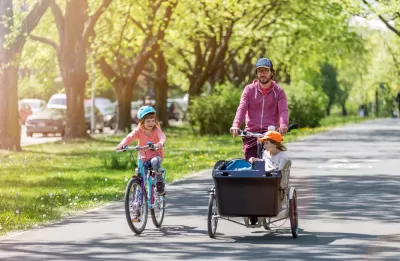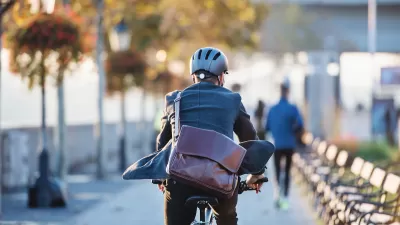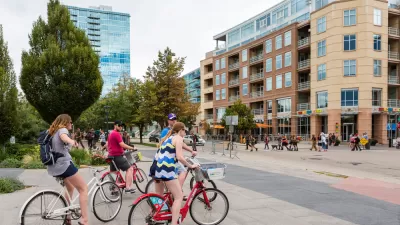Advocates say incentivizing e-bikes is a quick and effective way to reduce carbon emissions and shift U.S. transportation priorities away from car-oriented planning.

In a piece for NPR, Adam Bearne highlights the benefits of electric bikes, which can bring biking to more people and reduce carbon emissions. Some riders tout the benefits of e-cargo bikes, which allow them to efficiently transport groceries or children and replace drives with more pleasant outdoor time.
According to Bearne, e-bikes can provide a convenient alternative to cars for short trips. “The Bureau of Transportation Statistics found that in 2021, 52% of all trips were three miles or less. That's the kind of distance that most people can manage on an e-bike.” For Denver, a recent e-bike rebate program has proven hugely successful, with participants reporting that they replace an average of 21.6 miles of driving per week with bike trips.
Advocates are calling on the federal government to offer e-bike rebate programs as a tool for reducing carbon emissions. A proposed e-bike program was dropped from the Inflation Reduction Act last year after pressure from opponents. Noa Banayan of PeopleForBikes says “if we're giving people an incentive to choose cars, electric vehicles, and not necessarily an electric bicycle, then we're sort of locking our transportation system into the way that it has been, which is really car-dominated.”
FULL STORY: E-bikes could be a more affordable way to reduce emissions

Planetizen Federal Action Tracker
A weekly monitor of how Trump’s orders and actions are impacting planners and planning in America.

Maui's Vacation Rental Debate Turns Ugly
Verbal attacks, misinformation campaigns and fistfights plague a high-stakes debate to convert thousands of vacation rentals into long-term housing.

Restaurant Patios Were a Pandemic Win — Why Were They so Hard to Keep?
Social distancing requirements and changes in travel patterns prompted cities to pilot new uses for street and sidewalk space. Then it got complicated.

In California Battle of Housing vs. Environment, Housing Just Won
A new state law significantly limits the power of CEQA, an environmental review law that served as a powerful tool for blocking new development.

Boulder Eliminates Parking Minimums Citywide
Officials estimate the cost of building a single underground parking space at up to $100,000.

Orange County, Florida Adopts Largest US “Sprawl Repair” Code
The ‘Orange Code’ seeks to rectify decades of sprawl-inducing, car-oriented development.
Urban Design for Planners 1: Software Tools
This six-course series explores essential urban design concepts using open source software and equips planners with the tools they need to participate fully in the urban design process.
Planning for Universal Design
Learn the tools for implementing Universal Design in planning regulations.
Heyer Gruel & Associates PA
JM Goldson LLC
Custer County Colorado
City of Camden Redevelopment Agency
City of Astoria
Transportation Research & Education Center (TREC) at Portland State University
Jefferson Parish Government
Camden Redevelopment Agency
City of Claremont





























